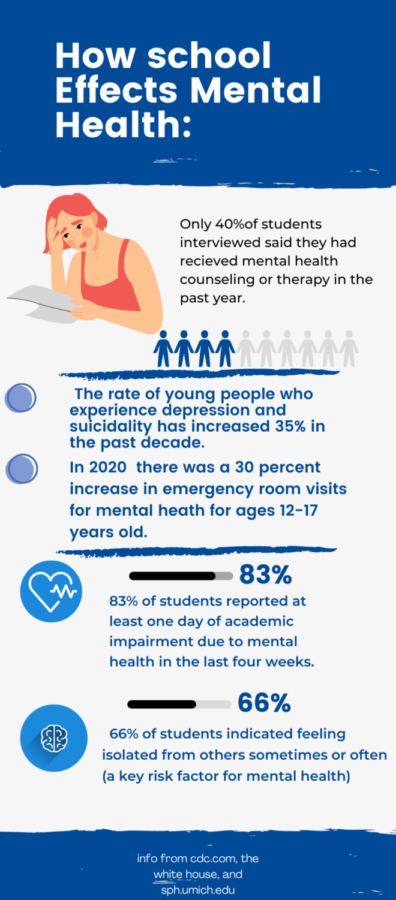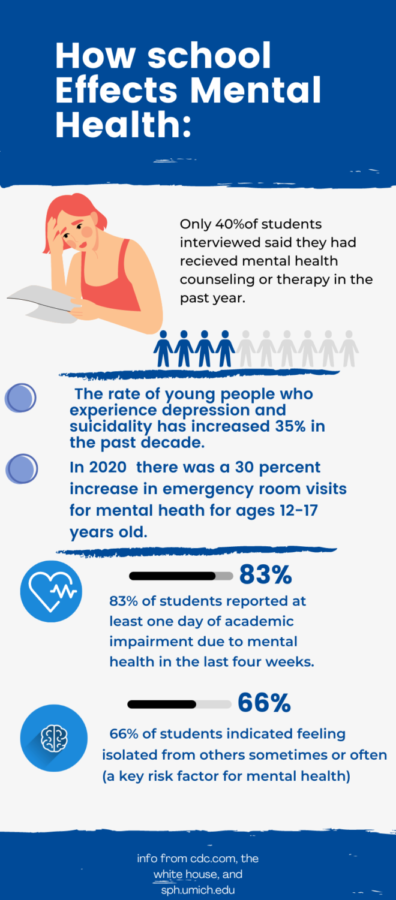Have you ever felt so stressed or anxious that you want to shut yourself away from the world? Felt so off that you felt like your entire self has changed?
Stress can cause changes, often hidden and built up, in emotional and behavioral patterns. Throughout life, people grow and change in the patterns of their emotional management, and if not treated properly or effectively, stress can cause long-term health problems.
“If we feel stressed too often, and for too long, it can cause us things like heart problems. It can cause sleep issues. It can cause a whole plethora of different issues.” Counselor Kelsey Wiest said.
“High levels of adrenaline and cortisol are going to increase your blood flow, your heart rate, and your heart is not meant to just be fast all the time, so that could lead to like your heart eventually just kind of getting tired and weakening of the heart muscle.” said AP psychology teacher Britt Coleman.
These problems are caused by what stress actually does to your body. According to Coleman, when someone is in a stressful situation, the brain releases hormones and neurotransmitters that get your body in alert mode.
“Stress activates part of your nervous system that’s going to, you know, kind of shut down non-essential functions and kind of put all your energy and increase your oxygen and blood flow, so you can run, or you can fight right? Typically, when the danger is gone, there’s another part of your nervous system that takes over, that’s going to bring your body back into like, okay, danger is gone, we can calm down,” Coleman said.
According to Wiest, many students have been coming to the counseling office with anxiety towards school.
“Some students were really isolated for a long time. And being around a large group of people who maybe are a little too loud or a little too rambunctious can cause some stress for some students. Being back on a regimented schedule might feel stressful for some students.” said Wiest.
Leigh Mahaffie, who is on the Character Strong team for PHS, says, “[Cortisol is] the chemical equivalent of a brick wall and they stop the neural pathways from transmitting. So, if you’ve ever walked into a test and you went blank, and you’re like, ‘I know this,’ you do. It’s just you’re stressed and the memories – you can’t get to those connections.”
“Some students deal with stress by just plowing through it, like doing everything that’s asked of them and being basically superheroes the whole time. That takes a toll right, that can make people crash, even if we don’t see it happening. I really worry about those kids because they’re doing everything asked of them and they’re still stressed out.” Michael Limric said, who teaches AP humanities classes and AP push at PHS.
Wiest adds that taking care of your body and mental state are both important aspects of keeping healthy.
“In order to take care of you, you’ve got to take care of both of those,” Weist said.
There are many distinct reasons why people, including students, will not get help to manage their stress. They may not have the right tools to manage emotions, the mental health stigma dissuades them from reaching out or they do not have a good support system.
“[Sometimes people don’t get help because] they might be embarrassed about whatever is causing them stress or anxiety. To them, they might think that some people think it’s silly or it shouldnt cause them any stress. A lot of times they bottle it up and then what happens is it compounds over time.” Wiest said.
“So that’s part of stress, not understanding why you’re struggling with things.” Limric said.
“I am a huge supporter of going to therapy. I do, once a week, and I think it’s important for people to know that I do that, because they always look at me and they’re like, ‘Oh, you’re a counselor, why do you need therapy?’ I think everybody can benefit from therapy, [where you] learn certain tools that can help with your emotions; we don’t always know how to deal with their emotions effectively, because it’s not something that’s just taught.” Wiest said.
Wiest adds that long-term stress can even effect changes into a person’s brain chemistry.
“Don’t be afraid to ask a teacher or a counselor and we’ll connect you with some way to hopefully make the situation better.” Mahaffie said.
“I think as a teacher, you have to make – this is gonna sound weird – you have to make every kid that walks in your classroom feel like the most important kid in the building.” Limric said.
As stress-relieving activities, Coleman suggested getting a good night’s sleep, not drinking energy drinks all the time, eating healthy food, and exercising.
“[Exercise] causes your body to release these endorphins which are kind of our body’s natural like painkillers, right, that help you deal with these stressful exercise situations, but they also make you feel really good.” said Coleman.
“When we take a break, we have a little timeframe of not having to worry so much. When we come back to the initial issue that’s causing us stress, we might be coming back with a clearer mind. Might be a little bit easier to process then.” Wiest said.







